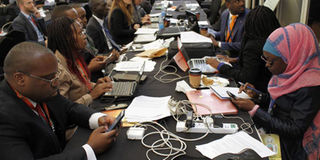Pressmen face tight security

Journalists follow the proceedings of the Global Entrepreneurship Summit at UN headquarters in Gigiri on July 25, 2015. US President Barack Obama and President Uhuru Kenyatta co-hosted the session. PHOTO | JEFF ANGOTE \ NATION MEDIA GROUP
What you need to know:
- But even the Americans are not perfect; they missed their own Wednesday deadline to confirm who would be allowed to go to the Jomo Kenyatta International Airport to cover President Obama’s arrival.
- When we surged towards the windows to take photos of an Osprey lifting off, it was cue for the US security woman to send us out of the terminal.
- At 8pm, American ambassador to Kenya, Robert Godec, Dr Auma Obama and little Joan strolled up to the table, escorted, naturally, by the ubiquitous men with the bulky jackets and stiff backs.
Americans like to work on schedules and with advance plans. It is not unusual for a dinner to be planned weeks in advance.
This could surprise a typical Kenyan, who can pop into the nearest restaurant for a date on a random day with a friend.
So when last Monday my editor asked me to submit my details — full name, identity card number, office telephone number, personal phone number — and whether I would need space to mount a camera to cover the arrival of President Barack Obama, I knew the time had come.
But even the Americans are not perfect; they missed their own Wednesday deadline to confirm who would be allowed to go to the Jomo Kenyatta International Airport to cover President Obama’s arrival. The confirmation e-mail would only come on Thursday evening.
Four of us — two writers and two photographers — got the greenlight to head to JKIA’s Terminal 2 by 3pm on Friday.
We got there on time, thanks to the decision by most people to stay away from the city centre, and joined a horde of local and international journalists.
Before that, though, were the security checks. At 3pm, the journalists lined up to enter the terminal. Officials counter checked our identity cards and job cards on their list. Those not on the list were denied entry.
We passed our watches, phones, belts, wallets, laptops and jackets through the scanner. Then we passed through walk-through scanner. But before I could step through the scanner, a Kenyan policewoman on the other side asked me to pass my spectacles through scanner as well.
“They are plastic,” I replied.
“Just put them in,” she said, and I did. I asked her why she would have plastic-framed spectacles scanned. “You can put something in them even if they are plastic. We don’t just watch out for metal,” she answered.
Photographers and cameramen, who feel naked when separated from their equipment, had to endure two hours without their tools of trade as they were checked. When we surged towards the windows to take photos of an Osprey lifting off, it was cue for the US security woman to send us out of the terminal.
At 6.15pm, we were called back to the terminal for another two hour-long wait, and a physical security check. The man and woman holding metal detectors, subjected each of us to a search, arms and legs spread apart. Former police spokesman Eric Kiraithe was photographed undergoing the search.
Joan Wamaitha, the eight-year-old flower girl from Mariakani Primary School in Nairobi, was also subjected to the screening, along with the flowers she was to present to President Obama.
On to the rostrum, the cameramen got their coveted equipment back and the minutes ticked away fast. When the last plane took off from the airport at about 7.30pm, the American officers took one last look at the tapes on the tarmac marking the point at which Air Force One would stop.
The Americans controlling the staircase truck revved their engines and one of the presidential cars was driven slowly past the rostrum. The Kenyan policeman guarding the table on which the KAA’s visitors’ book, the accompanying pens and the rolled up carpets chatted a bit with the press.
At 8pm, American ambassador to Kenya, Robert Godec, Dr Auma Obama and little Joan strolled up to the table, escorted, naturally, by the ubiquitous men with the bulky jackets and stiff backs.
President Kenyatta and his entourage emerged from the Presidential Pavilion, where they had been waiting for about 20 minutes and shuffled closer to the tarmac.
We had not seen the plane land in the dark, but as it taxied towards Terminal 2 and transformed from blinking lights on the wings and a lighted tail to a dark mass and then gradually the light fell on its blue and white nose, the rows of lighted windows, the words United States of America in black on the side, it was proof that for the first time in history, Air Force One was in Kenya.
The staircase was driven to the front and the man stepped out, waved briefly and then energetically jogged down the steps to receive the flowers from Joan and envelope her in a hug.
Finally, Kenya’s most famous son was on home soil.





